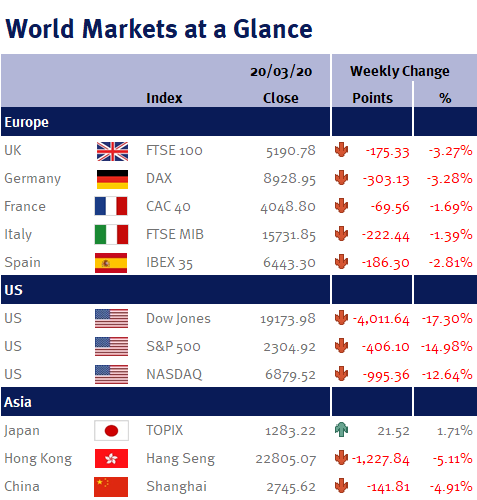Additionally, this is unlikely to be a “one-and-done” cut by the Fed. In fact, we would be shocked if the Fed doesn’t cut US interest rates further at their next meeting on Wednesday 18 March 2020. The same can be said for the BoE: we wouldn’t be surprised if the BoE reduces UK interest rates by 0.25% or even 0.5% at their next meeting on Thursday 26 March 2020, if not before.
While it is probably too early to say that equity markets will fully recover in the short-term, as the global consumer is suffering from a crisis of confidence due to the effects of the coronavirus outbreak (for example, travel companies – and airlines in particular – have been among the worst hit given their sensitivity to consumer sentiment and their boom-to-bust history), it is pleasing that the pace of new infections has slowed in China which will hopefully help to quell the uncertainty and allow equity markets to look past any coronavirus induced recession to a potential Q3 or Q4 2020 economic recovery.
Consequently, we would like to repeat our previous statements that although we remain positive on equities over the long-term, particularly those in Asia and Emerging Markets, with infections rising globally there is a good chance equity market volatility will remain elevated in the short-term. As such we are maintaining our short-term cautious stance with a slightly higher than normal level of cash (including liquidity funds).
Furthermore, in our discretionary portfolios, where clients have excess exposure to companies where coronavirus risks are pronounced, we have reduced or sold some of their holdings. For example, we have reduced Melrose Industries (due to its automotive and aerospace exposure) and Compass (contract catering services); and sold Carnival (travel) and Burberry (luxury goods) as they are likely to be hurt by lower consumer and tourist spending. We have also used this weakness as an opportunity to add to companies where their share prices are lower than they were just two or three weeks ago, such as National Grid, London Stock Exchange, Flutter and Unilever.
Elsewhere, the price of a barrel of Brent oil fell nearly 10% today (Friday 6 March 2020) after talks between OPEC and Russia to cut output in order to prop up the oil price collapsed (oil demand has been hurt by the coronavirus). Consequently, a repeat of the 1980s when the price of oil collapsed is now a possibility as Saudi Arabia and Russia are both likely to increase production at a time of slowing demand.
A lower oil price doesn’t simply mean cheaper petrol pump prices. More importantly oil accounts for a large proportion of the total cost to produce all sorts of everyday products from plastics, household products and clothes, not to mention the energy to produce food (fuel, electricity, fertiliser and pesticides) and metals (energy accounts for a large percentage of a mines operating cost and, for example, the production of aluminium).
This lower oil price is the equivalent of a massive tax cut for all consumers and all countries that import a significant amount of crude, such as Japan, China and India – and because the lower oil price will affect so many other goods and services, it will also further dampen inflation, which is already well below the targets of most global central banks.
Most of the economic data released this week covered a period when coronavirus was a Chinese problem, not a global one. For example, the UK PMI reading for February, while stronger than it was during 2019, slowed very slightly from 53.3 in January to 53.0 due to delays to new projects from companies in Asia. Likewise, in the US, the Beige Book said the US economy expanded at a modest to moderate rate in the period to 24 February 2020, while highlighting that the coronavirus outbreak was beginning to affect travel and tourism and may cause some supply chain disruptions. And while US employment also saw robust gains, with non-farm payrolls rising 273,000 during February and in the process reducing the unemployment rate to 3.5%, again it relates to a period prior to the coronavirus outbreak.
Virus updates aside, looking ahead to this coming week we have an ECB monetary policy meeting; UK industrial production and monthly GDP; US CPI; and Chinese CPI and import/export data. In addition, Rishi Sunak, our new Chancellor, will present his Budget Statement on Wednesday 11 March 2020.
We are also rapidly approaching the tax year end and so we would like to remind you that if you have not already taken advantage of your ISA allowance, now is the time to act. The current limit is £20,000 and if you don’t use it by 5 April 2020, you will lose it. Contact us using the details found in your email to start the process.
Investment Management Team


